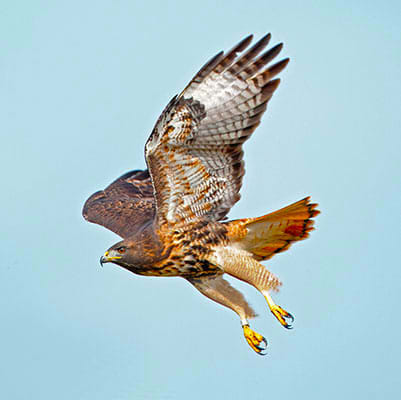
Why would a hawk move to New York City?

DISCUSS:
Which living things should you be able to find near you, next time you spot a squirrel?
Ask the questions:
1) What does it eat?
2) What is it eaten by?
Here's what we think...
A squirrel eats nuts from trees, such as acorns. So wherever there are squirrels, there are oak trees (trees that grow acorns).
A squirrel is eaten by birds of prey (like hawks, falcons, and eagles) and other predators like cats. So wherever there are squirrels, you should be able to spot those animals too!

DISCUSS:
1) What animals might live in your neighborhood? Come up with 3 places where you could look.
2) Ask the food chain questions: "What does it eat?" and "What is it eaten by?" Does this lead you to think of any new animals to look for?
The next video introduces a card game, “Eat or Be Eaten.” This was revised on 1/20/17. The older version, which features arrows on the cards, instead of chains, still accessible. But we strongly recommend using the revised version.












Below are ideas for extending this topic beyond the activity & exploration you just completed.
- End of Mystery Assessment and Answer Key
- Activity Extension: See Teacher Tips for a way to extend the Eat or Be Eaten game to include food webs.
- Activity: Invite pill bugs into your classroom.
- Activity: Combine art and science with a collage.
- Readings: Use readings to spark class discussions.
- Video: PBS Learning Media offers a fun video called What Do Animals Eat? with suggested discussion questions.
Pill bugs (also known as roly polys) are a kid-friendly critter for classroom observation.
Bugman Education offers Take a Pill Bug to Lunch, a inquiry-based activity for those willing to set up a pill bug habitat.
This video shows how simple setting up a pill bug habitat can be.
For more information on these critters, check out “The secret life of pillbugs” on The Infinite Spider, a science & nature blog.
These readings can start students thinking. Channel that energy into a class discussion.
Reading: Studies look at what happens when top predators become scarce. (Grade 3 reading level) Discuss: What happens when an animal is removed from a food chain?
Reading: Sea lion pups go hungry when water temperature changes. (Grade 3 reading level) Discuss: Can you think of other examples of environmental changes that could affect a food chain? (Think about examples from the Eat or Be Eaten game.)


